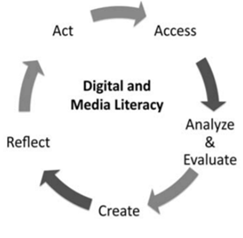New Voices RGU Student Series – Cameron Wilson
Category: New Voices, New Voices, RGU Student Series
In the Robert Gordon University Student Series blog, we share the views of RGU students from the MSc in Information and Library Studies course.
Today, we hear from Cameron Wilson, a library assistant at the University of Glasgow who is currently studying with RGU, and whose research interests include widening library access, technical library services, and the collection and indexing of poetry.
Staying Connected: Tackling Social Isolation through Digital Literacy During COVID-19
Social isolation and loneliness have often been referred to as an “epidemic” (Gerst-Emerson, K., and Jayawardhana, J., 2015) and continue to be a pressing public health issue across the globe, giving rise to “poor public health outcomes, decreased life expectancy, and increased risk of abuse, neglect, and exploitation” (Ciolfi, M., and Jimenez, F., 2017). Contributing strongly to this phenomenon is the deep ‘digital divide’ present in our communities. In Scotland, this digital divide is two-fold – firstly, in that urban areas have much higher levels of connectivity than rural areas, and secondly, that many within our population do not possess the skills necessary to effectively utilise the internet, among other information and communication technologies (Philip, L. et al., 2015). This issue is only further exacerbated by the on-going global pandemic – we are now working, learning and socialising digitally. Now more than ever, in a time of worldwide government-mandated social isolation, we yearn for social inclusion and a deeper understanding of our situation and place in the world.
Public libraries and their staff have always had a large role to play in public health – particularly mental health and wellbeing. Health On The Shelf, a recent report from the Scottish Library and Information Council (SLIC), discussed how the provision of health-related information; signposting to relevant organisations and sources; services and groups based within the library; and helping people with digital health information skills; all contributed to the health and wellbeing of the public (SLIC, 2020). These services all begin with the skills and training of information professionals themselves. It is our job as information professionals to keep up-to-date with current trends and advances in information technology, so that these skills can be passed onto the general public, allowing vulnerable, socially isolated people to fully participate in the information-rich society we live in.
Hobbs (2010) defines digital literacy as a “constellation of life skills that are necessary for full participation in our media-saturated, information-rich society” – the essential competencies are displayed in Figure 1. By utilising these vital skills, isolated people can feel more included in society – accessing the digital resources they need, understanding the value of these resources, using them to create new opportunities and experiences, reflecting on and sharing these experiences with others: these are the foundations of a healthy digital life that are essential during a global pandemic.
The information professional’s role is to “[create] inclusive, digitally-literate communities via the provision of online health, employment and education information as well as digital literacy programs” (Martzoukou and Elliott 2016 p. 100). Before we can pass on these vital digital literacy skills, we must be confident in them ourselves. This requires “continuing [staff] education on a more systematic level,” allowing public library staff to “stay up-to-date with fast-changing external technological environments” (Martzoukou and Elliott 2016 p. 100-101). As we have seen in recent months, vast parts of our world have moved entirely online – education, work, job interviews, medical treatment, socialising, and entertainment are now online affairs, being accessed through unfamiliar software like Zoom. Public librarians must step forward and become experts in such changes in order to effectively and clearly communicate these skills to the public.
In the UK, some voluntary organisations have provided extra support to those digitally isolated during the COVID-19 pandemic in the form of online resources. The Good Things Foundation has established an online ‘Coronavirus Support Centre,’ providing institutions like libraries with webinars and support for staff and learners. The Scottish Council for Voluntary Organisations has also contributed to this ongoing ‘national digital emergency’ by launching “No One Left Behind Scotland: COVID-19” – a campaign asking organisations to join in the effort to “find, equip, train, and support” those without internet access (Slater, A. 2020).
The COVID-19 pandemic has clearly highlighted the gaps in digital literacy that our society faces, and these projects, among others, will contribute greatly to providing those in need with digital access and skills – but they are limited. The most vulnerable in our society are still being missed – the homeless community has historically relied heavily on public libraries to provide not only shelter and social inclusion, but access to and education around digital resources (Hodgetts et al. 2008). Information professionals, especially those in public libraries, must constantly strive to support every part of society. The ongoing pandemic must be seen as an opportunity to reach out further and help the most vulnerable people in our communities feel socially and digitally included.
References
CIOLFI, M., JIMENEZ. and F., 2017. Social Isolation and Loneliness in Older People: A Closer Look At Definitions. University of Southern Maine Digital Commons. [online]. Available from: https://digitalcommons.usm.maine.edu/cgi/viewcontent.cgi?referer=http://scholar.google.co.uk/&httpsredir=1&article=1107&context=aging [Accessed 27 November 2020]
GERST-EMERSON, K. and JAYAWARDHANA, J., 2015. Loneliness as a public health issue: the impact of loneliness on health care utilization among older adults. American Journal of Public Health, 105(5), pp. 1013-1019
GOOD THINGS FOUNDATION, 2020. Home Page. [online]. United Kingdom: Good Things Foundation. Available from: https://www.learnmyway.com/ [Accessed 27 November 2020]
HOBBS, R., 2010. Digital and Media Literacy: A Plan of Action. The Aspen Institute Communications and Society Program. [online]. Available from: https://files.eric.ed.gov/fulltext/ED523244.pdf
HODGETTS, D. et al., 2008. A trip to the library: homelessness and social inclusion. Social & Cultural Geography, 9(8), pp. 933-953
MARTZOUKOU, K. and ELLIOTT, J., 2016. The Development of Digital Literacy and Inclusion Skills of Public Librarians. Communications in Information Literacy, 10(1), p. 99-115.
PHILIP, L., COTTRILL, C. and FARRINGTON, J., 2015. ‘Two-speed’ Scotland: Patterns and Implications of the Digital Divide in Contemporary Scotland. Scottish Geographical Journal, 131(3-4), pp. 148-170.
SCOTTISH LIBRARY AND INFORMATION COUNCIL, 2020. Health on the Shelf: Health and Wellbeing in Public Libraries in Scotland. Glasgow: Scottish Library and Information Council.
SLATER, A., 2020. No One Left Behind Digital Scotland: COVID-19. [online]. United Kingdom: Scottish Council for Voluntary Organisations. Available from: https://scvo.org/p/36175/2020/03/19/no-one-left-behind-digital-scotland-covid-19 [Accessed 27 November 2020]

